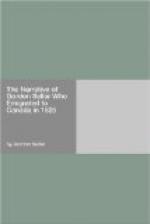Another agitation, less prolonged but fiercer while it lasted, was that which reached its head in the rebellion year. As was unavoidable, the rule of the province on its being organized, fell into the hands of the people who first came. They divided its public offices among themselves and managed its affairs. In time these first-comers were outnumbered by immigrants, but there was no change—the first-comers held to the reins. Had they used their power in the public interest, that would have been submitted to, but they did not—they abused their power for their own interests. They multiplied offices, increased salaries, grabbed the public lands, and laid the foundation of a national debt by borrowing money. There were instances of stealing of public funds, with no punishment following. Farmers became restless under an iniquitous administration of public lands. The discontent, which was as wide as the province, was taken advantage of by men who designed Canada should become a republic, and began an agitation to bring that about. Men, like the master, who ardently wished reforms, were repelled when they found the main object of the leaders of the agitation was the separation of Canada from Britain and would have nothing to do with them. The first time the master met Mackenzie he took a dislike to him, perceiving his overweening vanity, his habit of contradiction, and his lack of judgment. He said he was a specimen of the unpleasant type of Scot who meddled and denounced to attract attention and make himself of consequence. When he saw him shaping a rebellion he declared it would be a ridiculous failure, that no such whitrick of a creature could lead in the people’s cause. There were grievous wrongs to be righted, but he held the advocacy of the changes called for by such men as Mackenzie was a hindrance instead of a help to their being secured. Brodie’s oldest son was somewhat conceited, and had come to believe he was born to be something else than a farmer. I think the isolation of farm life conduces to develop that notion. The boy brought little in contact with his fellows, does not have his pretensions rubbed down, and comes to think he is superior to them. I have seen many such, who thinking they were business men, or would shine in some public capacity, or were fitted to adorn a profession, made shipwreck of their lives in leaving the plow. Hugh was one of those. A good fellow and a good worker with his father, he began by frequenting corner-stores at night and before long considered himself an authority in politics and was ready to argue in a long-winded and dreary fashion with any who disputed his crude assertions. Taken notice of by leaders in the agitation going on, appointed to committees and consulted as to plans on foot, he became carried away and neglected his home duties. When the explosion took place in December, 1837, he was one of those who met at Montgomery’s tavern. A decisive blow could have been struck had the men there gathered




